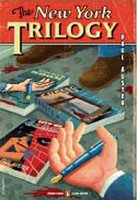 I have to say first that this Penguin Classic Deluxe is the of the prettiest paperback in my library - the pulpish art work by Art Spiegelman (on the cover and before each story) the quality paper with uncut edges, the whole "hand feel" of it made reading even more of a pleasure. This is how all paperbacks should be!
I have to say first that this Penguin Classic Deluxe is the of the prettiest paperback in my library - the pulpish art work by Art Spiegelman (on the cover and before each story) the quality paper with uncut edges, the whole "hand feel" of it made reading even more of a pleasure. This is how all paperbacks should be!I was new to Auster's work (apart from his film scripts for Smoke and Blue in the Face - both of which I loved) so was blissfully unaware of what to expect before I dove in to The New York Trilogy.
The book contains three novellas initially published separately: City of Glass (1985), Ghosts (1986) and The Locked Room (1986).
And in them Auster takes a familiar genre - the gumshoe detective novel - and completely subverts it into something so surreal that you can never be sure of the ground beneath your feet. Each story is a variation on the same theme and contains a character who is given the task of spying on or tracking down another, and in the process having his own identity slip away from him. Oh ... and characters called Paul Auster appear now and again, fountain-pen in hand, who may or may not be the same Paul Aster who is the author. It's clever and tricksy and disturbing and 'postmodern' (a term I know by feel but couldn't start to explain to save my life). A meditation on the layers and levels of reality created by an author.
I won't tell you the plots of the stories because I don't want to give anything away. (If you insist go here but beware of spoilers.)
I suspect the stories may appeal more to the blokes ... simply because male readers seem to prefer novels of ideas and don't bother as much about emotional connection. (Sweeping statement - tell me I'm wrong someone!) Sometimes I was reminded of Murakami, at other times Poe (especially in The Locked Room).
And strangely enough ... it struck me while reading City of Glass that this would make a great graphic novel. I was quite gobsmacked when Subashini told me in the comments to a previous post that it was already published in graphic form! You can take a look at the art work here.
Having said all this ... I admired the book a lot more than I enjoyed it (if that makes sense to you). It's that damn need to care about the people I'm reading about!
9 comments:
Morning Sharon,
My emails to you have been getting rejected since yesterday... :-(((
All marked "failure"!
ooooopps .. mailbox full
please resend!
Hey Sharon
Did you read this on PEnguin's blog? http://thepenguinblog.typepad.com/the_penguin_blog/2006/11/yourspace.html
Empty covers u can design on! Pretty cool.
Was linked to it from Boingboing.net.
oooh thanks jenn
I'm very shallow - my favourite part of the cover is the fountain pen in the hand :)
Sharon,
Sweeping Statement - you're wrong Sharon. Murakami and Hornby are among my favourites. You know I love novels on ideas and get fed up with overly emotional mush. But then many have remarked I'm more male than female in my attitude at times.
you are inseperable now in my mind from the heroine in your play - jumping into a masculine role to get things done. i think you would like auster if you haven't read him yet.
Bib, I think perhaps you will like 'Leviathan' and 'Vertigo' better as the characters are lovable and interesting.
I know exactly what you mean by a 'pliable softcover book'. Yeah, it stays open where you last read -- with a pretty undulation of the thin yet heavy pages.
Another point somewhat related: In Auster's 'Oracle Night', he mentions a teenage boy, whose parents are divorced, who misbehaves and lies to his loved ones. In his wife Siri Hustvedt's novel 'What I Loved', she also details such a character whose parents are also divorced. This has something to do with Auster's real-life son with his first wife, if I'm not mistaken. Apparently, he had a heartbreaking time with this offspring after his divorce.
By the way, I found 'Oracle Night' interesting in the way he had footnotes for clarifications or the history of certain events. The story isn't much but the way he wrote it is remarkable.
I like both ideas and characterisation, Bib.
Have to disagree with this one.. all paperbacks should have good story about all, I'm not paying for advertising (which is what the front cover and blurb are.) I don't care how "pretty" it is if the story's not compelling, but then again I'm not female.
Post a Comment